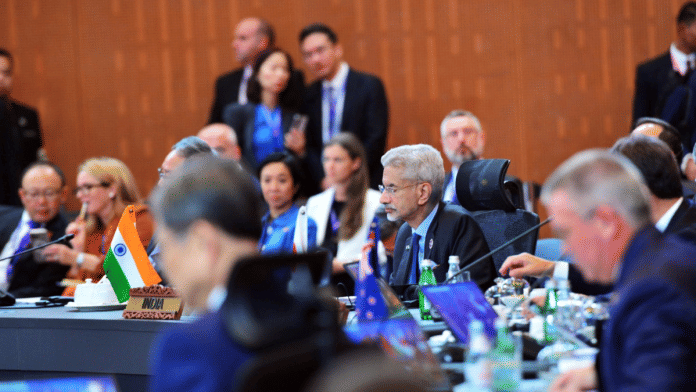New Delhi: Without naming any country, External Affairs Minister S. Jaishankar Monday criticised nations for “selectively applying” international principles and raised the issue of unfair unilateral sanctions constraining energy flows, calling out the “market distortion” they have caused.
The US, the UK and the European Union (EU) have all recently imposed sanctions on Russian oil giants Rosneft and Lukoil. Some private and state-run refineries in India have long-term purchase contracts with Rosneft, including Reliance Industries, which has an agreement to buy around 500,000 barrels of crude oil per day from the Russian company.
“There are growing concerns about the reliability of supply chains and access to markets. Technology advancement has become very competitive; the quest for natural resources even more so. Energy trade is increasingly constricted, with resulting market distortions. Principles are applied selectively and what is preached is not necessarily practiced,” Jaishankar said while delivering India’s national statement at the 20th East Asia Summit in Kuala Lumpur.
Jaishankar represented India at the summit after Prime Minister Narendra Modi decided not to travel to the Malaysian capital following a call with US President Donald Trump last week. Jaishankar attended the ASEAN-India Summit Sunday, which Modi addressed virtually. While the UK and the EU have targeted Russia’s energy sector in recent months, the sanctions announced by the US last week are the most impactful.
The sanctions imposed by Washington on Rosneft and Lukoil allow crude oil to flow from these firms until 21 November, after which the restrictions will take effect. Rosneft, which accounts for roughly 40 percent of Russia’s total crude production, has a large presence in India. It has invested in Nayara Energy, which operates the Vadinar refinery in Gujarat—hit by EU sanctions a few months earlier and UK sanctions a few weeks ago.
India’s purchase of Russian oil touched $56 billion in the 2024–25 financial year. Moscow became the largest source of India’s energy needs following the start of the full-scale war between Russia and Ukraine in February 2022.
India’s imports from Russia grew from around $3.1 billion in 2019–20 to over $50 billion within five years. The US under Trump has taken exception to India’s continued imports of Russian oil, imposing 50 per cent tariffs on exports from New Delhi.
The tariffs came into effect at the end of August. Washington has pushed India to reduce its purchases of Russian oil, and with the sanctions on Rosneft and Lukoil soon to take effect, New Delhi’s ability to continue this trade could be affected.
“But change has a life of its own. And the world will inevitably respond to new circumstances. Adjustments will be made, calculations will come into play, fresh understandings will be forged, new opportunities will emerge, and resilient solutions will be devised… Multipolarity is not just here to stay but to grow,” Jaishankar said.
Jaishankar’s remarks were delivered at the regional forum, which consists of 18 members—the 10 members of the Association of Southeast Asian Nations (ASEAN), along with India, China, Australia, South Korea, Japan, the US, New Zealand and Russia.
India has maintained that it will continue purchasing energy according to prevailing market conditions. However, Indian firms trading with either Rosneft or Lukoil could face potential secondary sanctions affecting their access to global—especially Western—markets.
According to reports, Indian refiners had already begun reducing their imports of Russian oil in recent months. Trump has consistently said that Modi personally “assured him” that Indian firms would curtail their dependence on Russian crude. The Indian government has neither confirmed nor denied Trump’s claim.
(Edited by Shashank Kishan)
Also Read: US sanctions Rosneft & Lukoil: What we know of 2 oil giants that produce half of Russia’s crude






